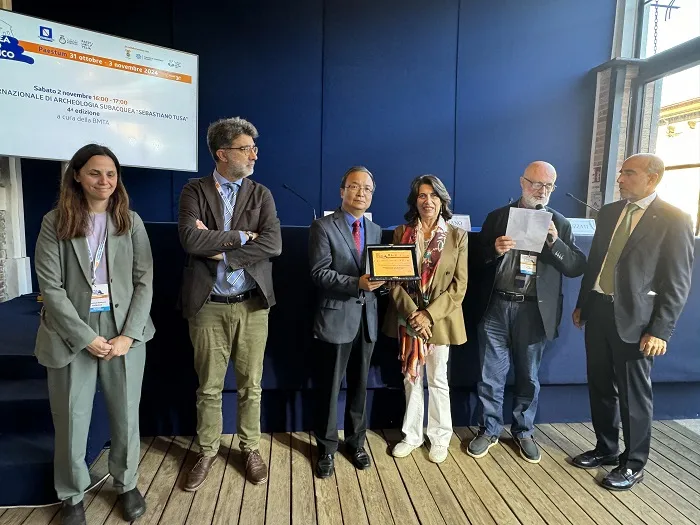Baiheliang Underwater Museum wins "Sebastiano Tusa" Archaeology Award
The Mediterranean Exchange of Archaeological Tourism (BMTA) took place from October 31 to November 3 in Paestum, Italy. During the exhibition, the prestigious fourth "Sebastiano Tusa" International Underwater Archaeology Award was presented to China's Chongqing Baiheliang Underwater Museum.

During the Mediterranean Exchange of Archaeological Tourism (BMTA), the prestigious fourth "Sebastiano Tusa" International Underwater Archaeology Award was presented to China's Chongqing Baiheliang Underwater Museum. (Photo/China National Tourism Office in Rome)
Named after the renowned Italian archaeologist Professor Sebastiano Tusa, the award is one of the most authoritative international recognitions in underwater archaeology. It honors individuals and institutions worldwide for their exceptional contributions to underwater archaeological research and heritage preservation. Chen Jianyang, director of the China National Tourism Office in Rome, accepted the award on behalf of the museum.
The Chongqing Baiheliang Underwater Museum, China's first underwater museum, was recognized for pioneering underwater archaeology and cultural heritage conservation efforts. This award marks international acknowledgment of the museum's significant contributions to preserving and studying underwater cultural heritage.
Chen said that the award acknowledges the museum's accomplishments and serves as recognition and encouragement from the Italian archaeological community for China's achievements in underwater archaeology.
"Both China and Italy are global leaders in cultural heritage, with rich histories and abundant tourism resources. This award would help Italian and European audiences better understand Chongqing while also offering Chinese tourists a better appreciation of Italy's exceptional tourist sites like Paestum," added Chen.
The BMTA is the only global event dedicated to exchanging and displaying archaeological heritage. It is also the birthplace of "virtual archaeology," showcasing archaeological heritage through multimedia and interactive virtual experiences. Since its inception in 1998, the expo has grown to attract over 10,000 attendees, with over 120 exhibitors from over 30 countries, 300 experts, and over 100 media outlets. It has become a leading platform in heritage tourism with significant international influence.


